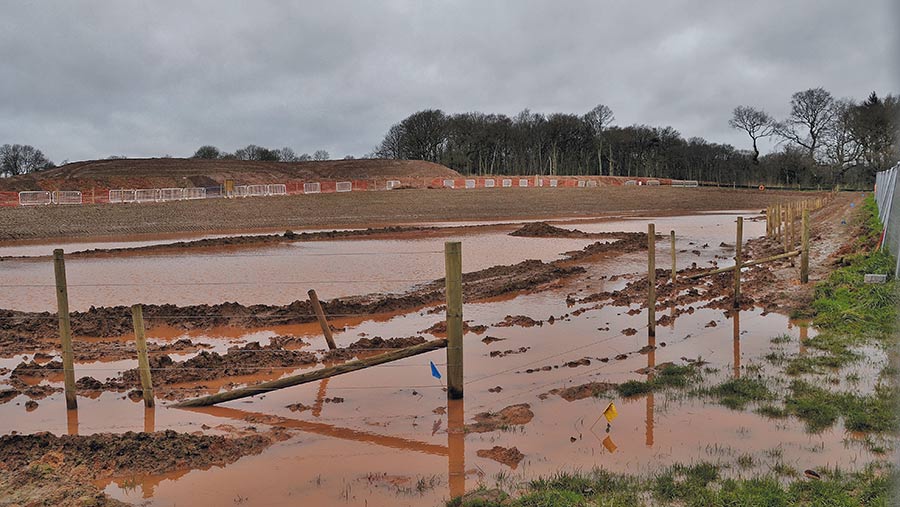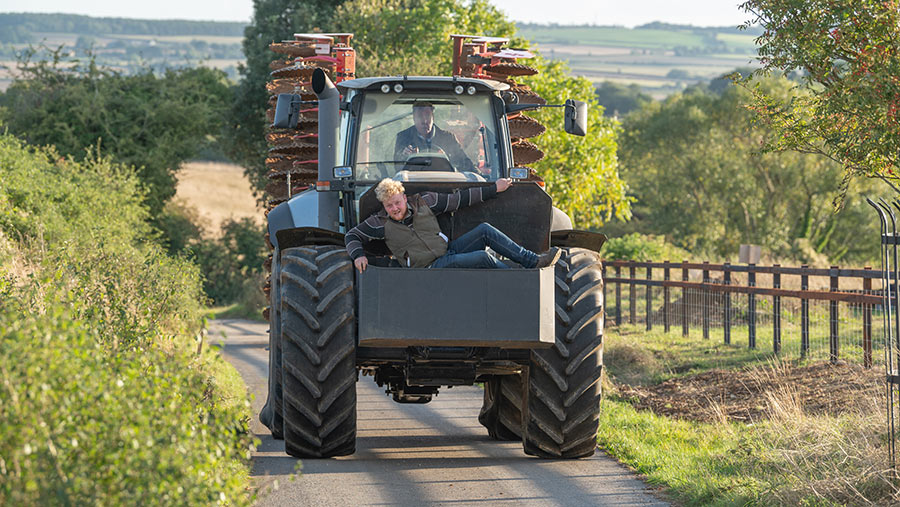2022: What made the news in January and February?
 Flooding caused by HS2 © Simon Henley
Flooding caused by HS2 © Simon Henley The war in Ukraine, soaring input prices, economic recession, a summer drought and political turmoil have combined to make 2022 a year to remember – and for some a year to forget. The impact on agriculture has been enormous.
Over the coming days, we look back on some of the key events that have helped shape the farming year, taking it two months at a time.
See also: Farmer cleared after flipping car ‘overwhelmed’ by support
January
CS payments
Payment rates for the Countryside Stewardship (CS) scheme options in England were increased by 30% on average, for both new and existing agreements early in the new year.
The then Defra secretary George Eustice said he hoped the increases would attract more farmers into the scheme and enable a smoother transition to its more ambitious successor under Environmental Land Management (ELM).
Land agents said the updated CS payments were a “mixed bag”, but upland farmers would welcome some of the biggest payment increases, such as for grassland management.
Asda beef U-turn
Beef farmers blasted Asda after it backed out of an earlier commitment to sell only British beef in its stores.
The retailer said the rising cost of British beef meant it would be sourcing Irish beef to deliver best value for hard-pressed customers.
The U-turn sparked a farmer backlash on social media. One farmer tweeted: “Once again, retailers’ promises to support UK farmers count for nothing.”
Bovine TB
A dairy farmer from south Wales who lost 240 cattle to bovine TB in just two years told how the situation had taken an immense toll on his family.
Stuart Williams was winning awards exhibiting his Willholme Ayshires, Brown Swiss and Holsteins at major events before the first herd breakdown in 2020 at Home Farm, Leweston, near Haverfordwest.
“Mentally, it has messed us up, and it is ruining all that we have ever built up,” he said.
Neonicotinoid-treated seed authorisation
Defra granted sugar beet growers in England authorisation to use neonicotinoid-treated seed due to the threat caused by virus yellows.
For the 2022 sugar beet planting season, growers were allowed to use seed treated with Syngenta’s neonicotinoid, Cruiser SB, after the threshold for use was met.
NFU Sugar board chairman Michael Sly welcomed the decision, noting that in 2021 virus yellows triggered crop losses of up to 80% in areas.
HS2 flooding fields
A Warwickshire arable farmer accused contractors building the HS2 high-speed rail line of failing to understand the basics of land drainage after farmland he owns bordering excavation works was repeatedly flooded.
David Jones posted disturbing photos on social media of flooded fields, broken land drains and overflowing retention ponds, with water pouring from the HS2 site into wildlife habitats in the Kenilworth area.
Defra lacking ambition
Farm leaders criticised Defra for lacking ambition, clarity and insufficient focus on food production in its plans for a future agricultural policy.
NFU president Minette Batters told a union council meeting on 25 January that the government’s seven-year agricultural transition “looks pretty bleak” and the industry “stood on a cliff edge”.
She called for more funding to be allocated to the Sustainable Farming Incentive, the first rung of Defra’s ELM scheme.
February
Clarkson’s Farm safety controversy
A photo used to promote the next Amazon series of Clarkson’s Farm caused a stir with farm safety groups.
The photo showed farm manager Kaleb Cooper balanced in the front weight block of the tractor with Jeremy Clarkson at the wheel.
Stephanie Berkeley, manager of the Farm Safety Foundation, said: “It is a pity that they chose to use this photo displaying such poor safety behaviour.”

© Amazon Prime Video
Victory for accused farmer
A tenant farmer who used a telehandler to flip a car parked on the drive outside his farm was cleared of dangerous driving and criminal damage at Durham Crown Court.
Durham hill farmer Robert Hooper, 57, told the court: “An Englishman’s home is his castle and my castle starts at that front gate.”
Mr Hooper later said he was “overwhelmed” by the outpouring of support from fellow farmers and the public since a jury cleared him of both charges.
Scots unimpressed with Defra
NFU Scotland president Martin Kennedy described Defra’s farming policy plans for England under its Environmental Land Management programme as a “car crash” and he warned that a lack of enthusiasm for the schemes will give the Treasury an excuse to divert cash elsewhere.
Mr Kennedy also blasted the Home Office for failing to expand the annual Seasonal Worker Scheme beyond 40,000 temporary visas.
Eustice ‘living a fairytale’
George Eustice faced a barrage of criticism from farmers for suggesting they could switch to organic manures to tackle high nitrogen fertiliser prices.
Merseyside arable farmer Olly Harrison said the then Defra secretary was living in a “fairytale” if he believed there was more organic manure available to spread on farm fields.
“I would like George Eustice to look behind the Defra sofa for some spare organic manure,” he told Farmers Weekly.
New NFU leaders for Wales
New NFU Cymru leaders vowed to represent the “whole of Welsh agriculture” – despite the two incumbents both hailing from strong dairy backgrounds.
Aled Jones, who runs a pedigree herd of Holsteins near Caenarfon, north Wales, was elected president, and Vale of Glamorgan dairy farmer Abi Reader was elected as deputy president.
